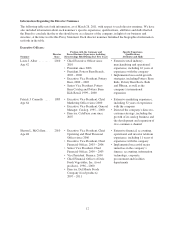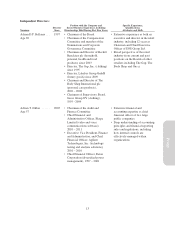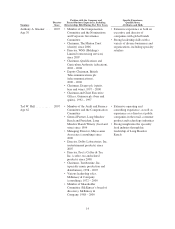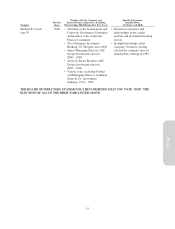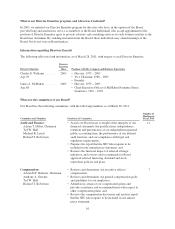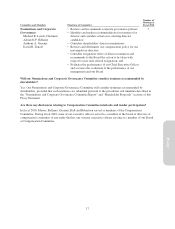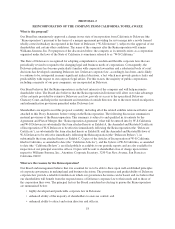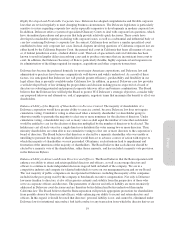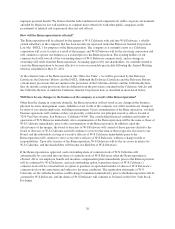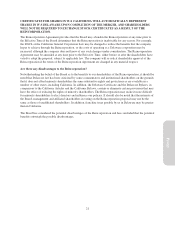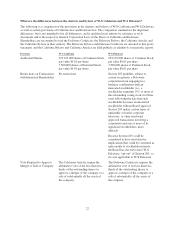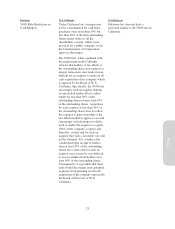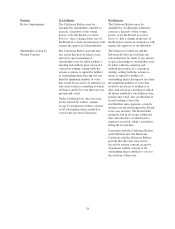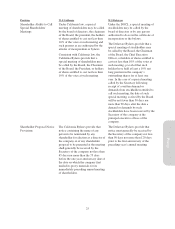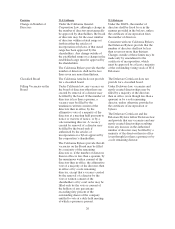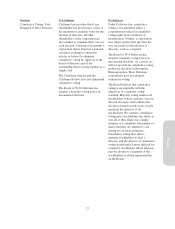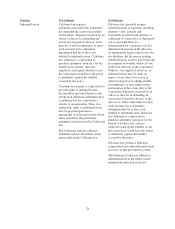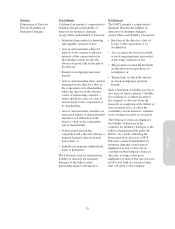Pottery Barn 2010 Annual Report Download - page 115
Download and view the complete annual report
Please find page 115 of the 2010 Pottery Barn annual report below. You can navigate through the pages in the report by either clicking on the pages listed below, or by using the keyword search tool below to find specific information within the annual report.
Highly Developed and Predictable Corporate Law. Delaware has adopted comprehensive and flexible corporate
laws that are revised regularly to meet changing business circumstances. The Delaware legislature is particularly
sensitive to issues regarding corporate law and is especially responsive to developments in modern corporate law.
In addition, Delaware offers a system of specialized Chancery Courts to deal with corporate law questions, which
have streamlined procedures and processes that help provide relatively quick decisions. These courts have
developed considerable expertise in dealing with corporate issues, as well as a substantial and influential body of
case law construing Delaware’s corporate law. In contrast, California does not have a similar specialized court
established to hear only corporate law cases. Instead, disputes involving questions of California corporate law are
either heard by the California Superior Court, the general trial court in California that hears all manner of cases,
or, if federal jurisdiction exists, a federal district court. This lack of specialized courts in California has been
known to result in lengthy delays in resolving cases and to produce outcomes that are inconsistent from court to
court. In addition, the Delaware Secretary of State is particularly flexible, highly experienced and responsive in
its administration of the filings required for mergers, acquisitions and other corporate transactions.
Delaware has become the preferred domicile for most major American corporations, and Delaware law and
administrative practices have become comparatively well-known and widely understood. As a result of these
factors, it is anticipated that Delaware law will provide greater efficiency, predictability and flexibility in our
legal affairs than is presently available under California law. In addition, in general, Delaware case law provides
a well-developed body of law defining the proper duties and decision making process expected of a board of
directors in evaluating potential and proposed corporate takeover offers and business combinations. The Board
believes that the Delaware law will help the Board to protect W-S Delaware’s strategic objectives, consider fully
any proposed takeover and alternatives, and, if appropriate, negotiate terms that maximize the benefit to all of our
shareholders.
Enhanced Ability of the Majority of Shareholders to Exercise Control. The majority of shareholders of a
Delaware corporation would have greater ability to exercise control, because Delaware law does not require
cumulative voting. Cumulative voting is often used when a minority shareholder (or shareholder group) is
otherwise unable to persuade the majority to elect one or more nominees for the election of directors. Under
cumulative voting, a shareholder may cast as many votes as shall equal the number of votes that such holder
would be entitled to cast for the election of directors multiplied by the number of directors to be elected. The
holder may cast all such votes for a single director or distribute the votes among two or more directors. Thus,
minority shareholders are often able to use cumulative voting to elect one or more directors to the corporation’s
board of directors. The Board believes that directors so elected by a minority shareholder who was unable or
unwilling to persuade the majority of shareholders would then act to advance courses of action with respect to
which the majority of shareholders was not persuaded. Oftentimes, such situations lead to impediment and
frustration of the intentions of the majority of shareholders. The Board believes that each director should be
elected by a majority vote of the shareholders, rather than a minority, and has included a majority vote provision
in the Delaware Bylaws.
Enhanced Ability to Attract and Retain Directors and Officers. The Board believes that the Reincorporation will
enhance our ability to attract and retain qualified directors and officers, as well as encourage directors and
officers to continue to make independent decisions in good faith on behalf of the company. We are in a
competitive industry and compete for talented individuals to serve on our management team and on our Board.
The vast majority of public companies are incorporated in Delaware, including the majority of the companies
included in the peer group used by the company to benchmark executive compensation. Not only is Delaware
law more familiar to directors, it also offers greater certainty and stability from the perspective of those who
serve as corporate officers and directors. The parameters of director and officer liability are more extensively
addressed in Delaware court decisions and are therefore better defined and better understood than under
California law. The Board believes that the Reincorporation will provide appropriate protection for shareholders
from possible abuses by directors and officers, while enhancing our ability to recruit and retain directors and
officers. In this regard, it should be noted that directors’ personal liability is not, and cannot be, eliminated under
Delaware law for intentional misconduct, bad faith conduct or any transaction from which the director derives an
19
Proxy





